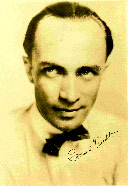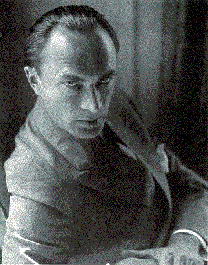
The Conrad Veidt Society

He was the most riveting screen actor of his generation: tall, militarily erect,
with a classic profile, a cruelly voluptuous mouth, eyes that could charm, seduce
or terrify with a mere glance. His colleagues were always somewhat in awe of him.
His intensity in performance often proved contagious. Joan Crawford, who co-
And Robert Morley, who was once a dialogue director on one of Veidt's British films,
said that "(he) was a master at delivering lines and had been delivering them in
the same way for years. He always spoke rather fast and softly when everyone else
spoke loudly. On the screen this seemed most effective." The description hardly does
its subject justice, for Veidt's expertly stage-
Conrad Veidt, born one hundred years ago this January 22*, was a Berliner where
he became an actor as a teenager studying under the great Max Reinhardt, and entered
the movies in 1917 after being invalided out of the army. He created a sensation
with his portrayal of the sinister somnambulist Cesare in The Cabinet of Dr.Caligari,
and remained a star ever since, being often in demand for roles calling for either
a wildly poetic intensity or a demonic power. After a brief sojourn in Hollywood
in the late twenties (catch his scene-
Veidt spent most of the rest of the 1930s in the British cinema and eventually
became a naturalized citizen. In retrospect, it's intriguing how fond British audiences
were of him since he often played suavely monocled German officers and spies (most
effectively in Michael Powell's The Spy in Black in 1939). The British fan magazines
doted on him, and he even wrote for them on occasion, expressing among other things,
a long-
Of course, it's his Hollywood career for which he is best remembered in this country,
and particularly the two Warner Brothers outings in which he contended most effectively
with Humphrey Bogart (All Through The Night and the classic Casablanca). The famous
auction scene in the former also provided a chance for Veidt to indulge his skill
at slipping in delightful flashes of comedy in an otherwise straight melodrama. he
gets an even better opportunity to do this in his last film, Above Suspicion (1943),
in which for once, he gets to play a good guy, constantly showing up in the nick
of time to help would-
A great many of Veidt's films are available on video, including laser discs of Caligari, The Beloved Rogue, The Spy in Black, and, of course, Casablanca. Many of the British and German films are available from small companies such as Sinister Cinema (The Passing of the Third Floor Back and F.P.1 Does Not Reply), Nostalgia Home Video (The Last Performance), LS Video (The Hands of Orlac and the very rare 1926 version of the supernatural classic, The Student of Prague), Henwood (I Was A Spy and Contraband), and others too numerous to mention. There are also at least two biographies in the works, and a third by J.C. Allen currently published by Boxwood Press, as well as a fan club, the Conrad Veidt Society.
Randolph Man teaches film at the College of Santa Fe's Garson Communications Center.
*This article appeared in THE Magazine, January/February 1993 issue.
Photo by Edward Steichen, 1929
"Are you a Magician...?"
"I have some skill."
Women Fight...For Conrad Veidt!
by Randolph Man